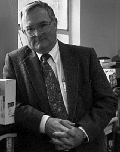
ORVILLE L. CHAPMAN
Professor; PhD, Cornell University; ACS Award in Pure Chemistry;
Texas Instrument Founders Prize; National Academy of Sciences; ACS
Arthur C. Cope Medal; Havinga Foundation Medal; Herbert Newby McCoy
Award; Computerworld-Smithsonian Institution Award in Education.
Research Summary
Reaction mechanisms, novel materials, and chemical communication comprise
our research interests. Our recent work on reaction mechanisms has focused
on divalent carbon and univalent nitrogen chemistry and elucidation of the mechanism of arylmethylene rearrangements. These mechanisms include ring expansion of arylmethylenes to cycloheptatetraenes. Argon matrix
spectroscopy plays an important role in our mechanistic investigations, and photochemistry provides many challenges. We also use matrix techniques to prepare and characterize unusual molecules of theoretical interest. The
parent monomer of graphite, C6 and dodecadehydrodiamantane represent two examples of current problems. Our interest in novel materials derives from
our interest in novel molecules and emphasizes physical properties. We seek to prepare organoferromagnets and materials with unusual strength and hardness. One major goal is the rational synthesis of spherical C80, which we expect
to have most unusual properties. Carbons of all kinds fascinate us. Particulate carbon emissions from gasoline engines pose an increasing health hazard; these particles react with almost anything including air.
These reactions produce diazocompounds, carbonyl oxides, perepoxides, and
other dangerous materials. Matrix techniques also serve in determining these chemical processes. In the biological area, we study chemical communication: insect-insect communication, insect-plant, plant-plant, and cell-cell communication. At this time
, we are developing materials that resist
macrophage assault when implanted in human bodies, and we are designing solid materials that possess immune recognition sites. Our newest interest,
chemical robotics, involves building robots that do synthesis.
Key Words
Organic Chemistry: reactions mechanisms; matrix spectroscopy;
polymers; organoferromagnets; conducting materials; pheromones and
immunochemistry; information-technology-based learning.
[ Department *
Faculty *
Current Organic Research *
Organic Research Interests
]
Last
Revision: 10/26/95 // mk
